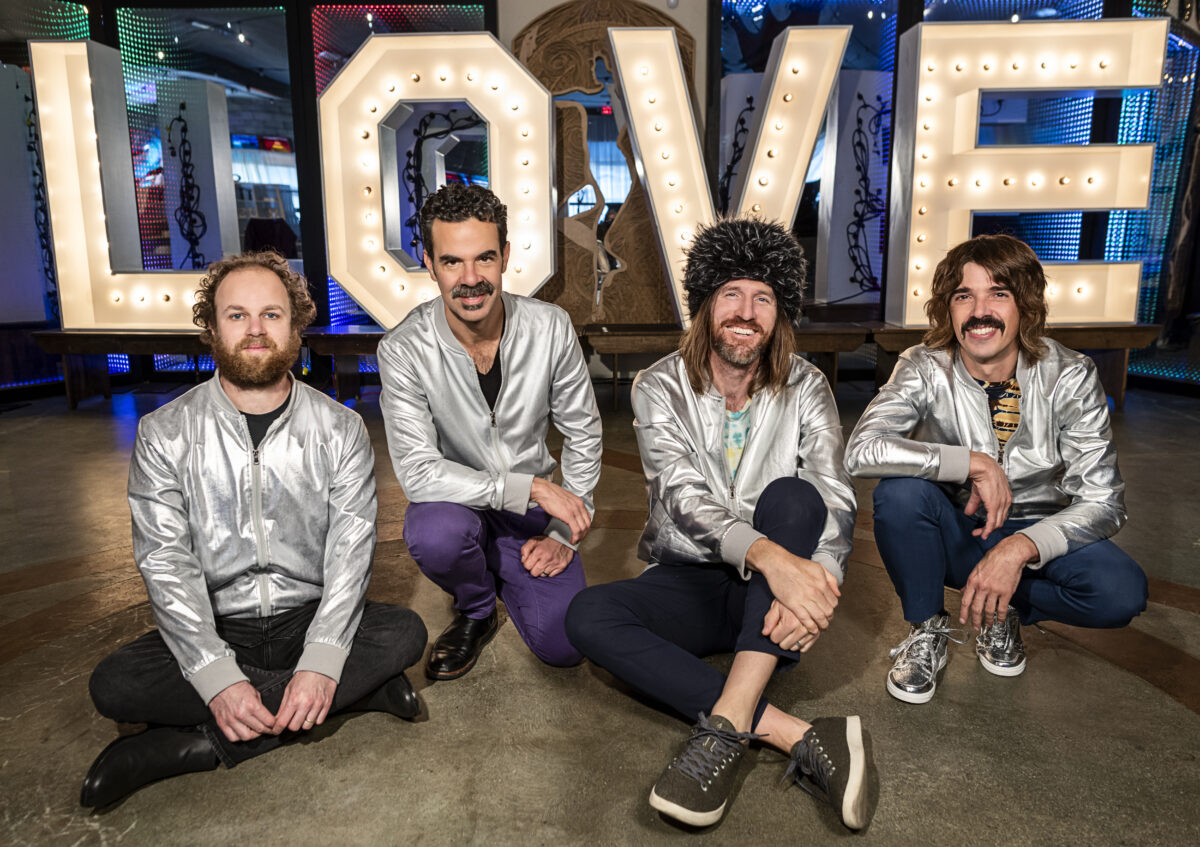
2024 SUMMER CONCERTS
All Shows will take place at the historic Howelsen Hill in downtown Steamboat Springs.
Saturday, June 22nd
Kitchen Dwellers
In “Seven Devils,” Kitchen Dwellers embark on a journey paralleling Dante’s Inferno, exploring themes of sin, self-realization, and accountability through folk-infused bluegrass with a psychedelic twist. The album, produced by Glenn Brown in Michigan, delves into universal topics like mental health and human experience, while each song correlates with a sin, reflecting the band’s interpretation of the Inferno story.
Starting with “Seven Devils (Limbo),” the album traverses emotional landscapes, from regretful musings to somber reflections on loss and addiction, and poignant commentary on societal issues like gun violence. Tracks like “The Crow and The Raven (III)” and “Unwind (Paradiso)” offer introspective moments, exploring personal growth and surrendering to change.
Overall, “Seven Devils” invites listeners on an inward journey, urging reflection on inner happiness and the human condition. Through its immersive storytelling and musical craftsmanship, Kitchen Dwellers deliver their most ambitious work yet, leaving a lasting impact on the listener.
with special guests Bonfire Dub
Saturday, July 20th
The Machine Performs Pink Floyd
For over 30 years, The Machine has upheld Pink Floyd’s musical legacy with faithful renditions of their extensive catalog. Based in New York, the quartet delivers both popular hits and lesser-known gems from Pink Floyd’s 16-album repertoire.
With exceptional musicianship, The Machine captures the improvisational spirit of early 1970s Pink Floyd, while incorporating theatrical elements reminiscent of the 1980s era. They are renowned for recreating entire albums during their performances, accommodating fan requests, and employing an A-Z approach where each letter corresponds to a song.
The Machine’s success spans sold-out shows in theaters, premier venues, and casinos worldwide, including appearances at major music festivals like Bonnaroo and Gathering of the Vibes. They’ve collaborated with symphony orchestras across North America, Europe, and Asia, including notable ensembles such as the Atlanta Symphony Orchestra.
<iframe width=”560″ height=”315″ src=”https://www.youtube.com/embed/5vfctnjtNAI?si=dp–RTNdIw-EC2P1″ title=”YouTube video player” frameborder=”0″ allow=”accelerometer; autoplay; clipboard-write; encrypted-media; gyroscope; picture-in-picture; web-share” referrerpolicy=”strict-origin-when-cross-origin” allowfullscreen></iframe>
Featuring founding member Tahrah Cohen on drums, along with longtime bandmates Scott Chasolen on keys and vocals, Ryan Ball on guitar and vocals, and newest addition Chris DeAngelis on bass and lead vocals, The Machine honors Pink Floyd’s music while commemorating the legacy of co-founder Joe Pascarell, who passed away in 1988.
with special guests Worried Men
Saturday, July 27th
Fruition
Fruition’s three-part harmonies and impromptu performances captivated crowds on street corners and in campgrounds in the Pacific Northwest initially, but their remarkable 15-year journey has seen them emerge as a singular force in the world of Americana on some of the nation’s biggest stages. Channeling the delicate, playful, and honest focus on songcraft and vocal harmony of groups like the Beatles and CSNY, the band continues to create timeless and genuine folk, roots, and rock ‘n roll.
Distinguished by three accomplished songwriters and a rhythm section that serves each song with a finely tuned attention to detail and aesthetic, Fruition manages to consistently release a body of work that is both uniquely their own and instantly familiar. 2024 will see them release a brand new studio album while preparing a 2nd album for 2025 and a full complement of festival and headline touring.
<iframe width=”560″ height=”315″ src=”https://www.youtube.com/embed/u0QYK0LJt2I?si=GFZVnnGJ_MHv-K1p” title=”YouTube video player” frameborder=”0″ allow=”accelerometer; autoplay; clipboard-write; encrypted-media; gyroscope; picture-in-picture; web-share” referrerpolicy=”strict-origin-when-cross-origin” allowfullscreen></iframe>
Mama Magnolia
Mama Magnolia is a dynamic bicoastal six-piece indie-soul band known for their rich, genre-blending sound and emotionally charged performances. Comprising vocalist Megan Letts, saxophonist Alex Cazet, guitarist Thomas Jennings, drummer Jackson Hillmer, trumpeter Carrie McCune, and bassist Zach Jackson, the group creates music that seamlessly fuses soulful melodies, intricate jazz influences, and rock rhythms. Their debut full-length album, *Dear Irvington*, showcases their ability to transform personal and tumultuous experiences into compelling, groovy compositions, reflecting both their technical prowess and emotional depth. Mama Magnolia’s sound is marked by its playful complexity, vulnerability, and a fearless exploration of challenging themes.
Friday, August 9th
ALO
ALO, short for Animal Liberation Orchestra, believes music liberates the inner animal. Zach Gill, Dan “Lebo” Lebowitz, and Steve Adams formed the trio as pre-teens in Saratoga, California, bonding over their shared passion for music.
Their musical journey began in junior high when they assembled a band for their eighth-grade talent show. Zach recalls the challenges of being an emerging artist during adolescence, while Lebo describes how music provided them with identity and direction during their formative years.
Over the past twenty-five years, ALO has evolved into a cohesive unit, with the addition of drummer Ezra Lipp. They’ve reached new heights with their latest album, a testament to their enduring friendship and musical mastery.
Having collaborated with luminaries like Phil Lesh and Jack Johnson, ALO’s magic truly shines when they perform together. Their genre-defying sound, described as “jam-pop,” blends meticulously crafted compositions with improvisational flair, showcasing their telepathic connection and years of shared experience.
Their latest album, “Silver Saturdays,” reflects on their journey so far and anticipates the road ahead. Join ALO for a musical adventure filled with intention, momentum, and the wisdom gained from a quarter-century of collaboration.
with special guests Graham Good & The Painters
Sunday, September 1st
Keller Williams’s Grateful Grass feat. The Hillbenders
Definition: “Loose interpretations of Grateful Dead songs done in a bluegrass style. Take my fascination with Grateful Dead songs and mix it together with my love of psychedelic improvisational bluegrass music and out burps this project.
WARNING: If you like your Grateful Dead songs performed in their original way, or if you prefer traditional bluegrass, this is not the project for you. If you like singing along to Dead songs in that song’s normal tempo but dancing double time to the music, this is definitely your jam. A lot of people seem to dig it and I dig them for that.”
Keller’s Grateful Grass delivers anything-but-traditional bluegrass versions of Grateful Dead favorites. Grateful Grass often times has a rotating lineup and so far, has included collaborations with The Keels, Keith Moseley (SCI), Jeff Austin (Yonder Mountain String Band), Michael Kang (SCI), Reed Mathis (Tea Leaf Green, Mark Benevento Trio) Bill Nershi (SCI), Allie Kral, Vince Herman (Leftover Salmon), Sam Grisman, Love Canon, The Infamous Stringdusters and the Hillbenders.
In 2008, the original Grateful Grass members (Keller, Jeff Austin and Keith Moseley) recorded a live performance at The Fillmore in Denver, CO. 100% of the proceeds from REX (Live at the Fillmore) went to benefit The Rex Foundation, the charitable non-profit started by the Grateful Dead.
In 2010 Grateful Grass took the stage at Delfest for the first live appearance since 2008. In 2013, Grateful Grass ft. Keller, Jeff Austin, Keith Moseley and Michael Kang reunited to benefit the Rex Foundation once again at The Fillmore in San Francisco for the event, Nightfall of Diamonds. Once again this performance was recorded and DOS was released in 2014. All proceeds continue to benefit the Rex Foundation.
“Different collaborations of Grateful Grass will pop up from time to time as playing this music this way is such a blast that it probably should be illegal.” — Kw
Little Moon Travelers
The Little Moon Travelers blend folk, old time and roots Americana influences to produce a sound that harkens to times past. The band took shape in a local hideaway called Little Moon Trail in the hills of Steamboat Springs, Colorado. During the covid lockdown, these musicians gathered around the fire pit with their instruments. These unrehearsed get-togethers helped them and many others ward off the restlessness we all felt. The informal strumming sessions invited those listening to put aside their worries and connect more freely with each other in the present moment. They are thrilled to bring to the world their brand of live roots music.
WE APPRECIATE YOUR SUPPORT
Thank you Steamboat for another great summer of concerts.
These concerts are one of the core community events in Steamboat every year and we couldn’t make them happen without your support. So thanks for all the donations and volunteering that make this possible. While we get started on making next summer even better, take a look back at all the fun we had.














